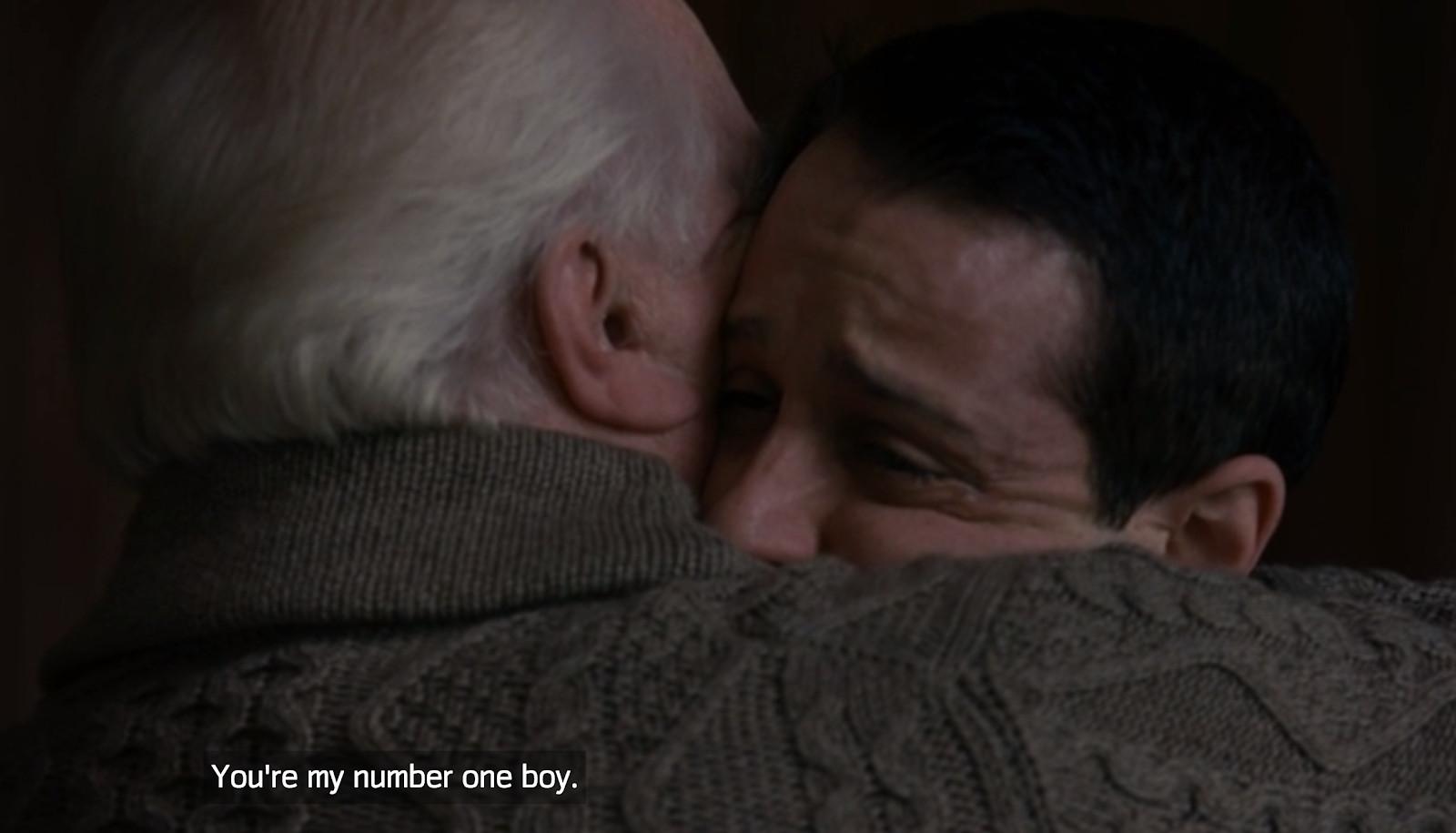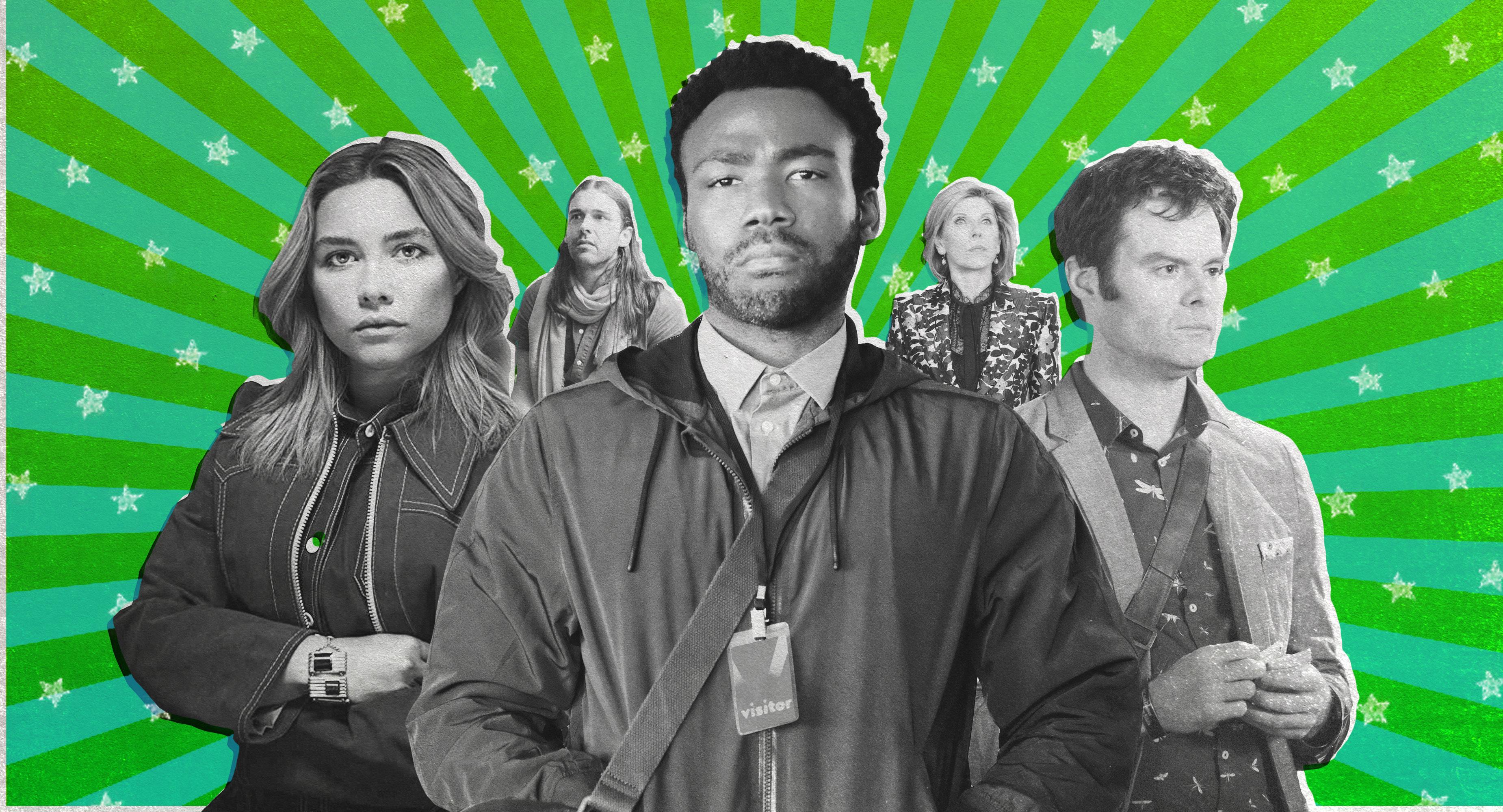The Best Television Shows of 2018
Including ‘Succession,’ ‘Atlanta,’ and eight more shows that everyone (or at least two critics) can agree onIn the Peak TV era, everyone has a different favorite show—so this year, Alison Herman and Chris Ryan paired up to build a top 10 list that reflects a range of tastes and viewing experiences. (And one that almost certainly omits a show you loved.) For more about the Year in Television, read Alison Herman’s essay about the the making of this list, Andrew Gruttadaro and Miles Surrey’s ranking of 2018’s Best TV Episodes, and Miles Surrey’s list of the Best TV Monsters.
10. Queer Eye
In a landscape littered with reboots that tweak the gender, race, or sexuality of their heroes to fit our current representational ideal, Queer Eye tries the opposite tack: bringing an ahead-of-its-time concept to the present day in order to show how those ideals, if not the people being represented, have changed. An identical setup—five gay men with individual specialties collectively form a sort of mega-guru—plays very differently in 2018 than it first did in 2003. Our notions of gender are more mutable, so … For the Straight Guy gets dropped; our view of masculinity is more critical than lovingly exasperated, and undisputed breakout Jonathan Van Ness doles out tips for emotional intimacy as well as moisturizer. Netflix remains as tight-lipped about metrics as ever, but the Fab Five’s real-world ubiquity suggests their gospel has struck a cultural nerve. Antoni may well be incapable of cooking anything that does not contain avocado, and now he has a whole restaurant! Queer Eye is a reality television program, and is as prone to blatant emotional manipulation and nakedly capitalist bootstrap logic as any other. But it’s a contemporary kind of emotional manipulation, and one that channeled the zeitgeist better than most scripted series this year. —Alison Herman
9. Howards End
Never mind the petticoats, Howards End is a costume drama that puts the emphasis on the drama, rather than the costumes. Sure, there’s fancy dresses and three-piece suits, along with impeccable manners, clackety trains, and tragi-comic cases of miscommunication and repression. But Kenneth Lonergan and Hettie Macdonald’s period piece embraces the period—turn-of-the-20th-century London—for what it really was: the dawn of modernity. The characters and performances crackle with a contemporary energy, and underneath the high jinks about inheritances and London’s postal service, Howards End is essentially a story about people looking for love and dignity in a society that made those things impossible to really have, unless you had the right last name.
The modern spirit of the show is embodied in its lead performance. Asking Hayley Atwell to play the lead character Margaret Schlegel is like handing a basketball player a no. 23 jersey and telling them to go play shooting guard for the Bulls. That’s the kind of legacy Emma Thompson created when she starred in James Ivory’s 1992 big-screen version of E.M. Forster’s novel. And yet Atwell just drains fadeaway jumpers for four hours, bringing a relentless intellectual energy to the role. I can pay this show no higher a compliment than to say its star improved upon perfection. —Chris Ryan
8. Better Call Saul
Better Call Saul is a love letter to process. It’s a show about clerical work and research and engineering and chemistry. Forget Breaking Bad, they should call this Breaking Rules. In a time when everything is intellectual property, part of some interconnected universe to be explored, it is a testament to Better Call Saul’s brilliance that there is no urgency to catch up to its mothership show. It’s not about the winnebago in the desert, it’s about enjoying (or in this case, dreading) the scenery along the way.
Season 4 was essentially two shows in one—a legal drama, featuring a disbarred lawyer, and a cartel thriller featuring a somewhat reluctant bag man. Whatever dull itch the viewer had about when the Gus Fring and Saul Goodman story lines would finally meet was scratched by the painstaking plotting and expert execution every week. Why did Peter Gould and Vince Gilligan make a Breaking Bad prequel show about secondary Breaking Bad characters? Because they are really, really good at doing it. —CR
7. Salt, Fat, Acid, Heat
Salt, Fat, Acid, Heat is not quite a cooking show and not quite a travelogue, and the lack of precedent makes the Netflix miniseries an unusually direct extension of, and perfect platform for, star-creator Samin Nosrat. Fellow food TV stars like Ina Garten and Nigella Lawson developed their specific voice within the comforting confines of a half-hour instructional session. Nosrat’s show, adapted from her 2017 book of the same name, shares more than a few touchstone with these predecessors: meals prepared in a gorgeous, extremely staged kitchen (the real Chez Nosrat lacks a dishwasher); a carefully curated assortment of recurring characters to conjure just the right mix of hominess and aspiration. But these are mere accents to Nosrat’s core message: that cooking, across continents and cultures, has four basic elements, and any amateur can train their instincts to master them. No passport required. It’s a radical, sometimes contradictory message; we may not have to go to Italy to experience the joys of well-deployed fat, but we’re here to watch Nosrat go in our stead. Nevertheless, Nosrat announces herself as an enthusiastic, democratic avatar of home cooks everywhere. If the sudden prevalence of tahdig on my Instagram is any judge, her following is legion. —AH
6. Barry
It’s no surprise that Bill Hader can make people laugh. It’s not even a surprise he can capital-a Act. But five years after his departure from SNL, Hader’s collaboration with Alec Berg still feels like a curveball. There’s the wacky premise—professional hitman finds himself through (terrible) acting—handled with empathy, composure, and a minimum of shtick. And then there’s Barry’s remarkable ability, sustained over eight episodes, to weave nimbly between Coen brothers–esque crime caper, show business satire, and dead-sober tragedy of a man’s soul-eroding moral decay. It’s impressive to watch an established master like Hader use a blank slate to challenge himself, and admirable to see him share his spotlight with Anthony Carrigan, Glenn Fleshler, and of course, fellow Emmy winner Henry Winkler. Mostly, it’s refreshing to watch a show blend drama with comedy without falling into the trap of the dreaded, jokeless “dramedy.” Barry is no hugging, no learning, all killing. Literally. —AH
5. The Good Fight
We’ll be straightforward here: This is an advocacy pick. We know there’s almost no way you subscribe to CBS All Access, that awkward stepchild of a streaming service, which means it’s also unlikely you’ve seen The Good Fight, the Good Wife spinoff that found its groove in its second season by channeling liberal outrage, disgust, and, above all, delirious amusement at these interesting times. (No, you don’t need to watch The Good Wife first, though you’ll get an extra kick out of the occasional Denis O’Hare drop-in if you do.) At a moment when actual satire has fallen woefully short on the job when lampooning the current administration, creators Robert and Michelle King have found the ideal application for their years of experience in ripping compelling, compressed drama from the headlines. The Good Fight squeezes enormously complex issues—immigration policy! The shifting composition of the federal judiciary!—into 50 minutes or less without sacrificing either nuance or the spiky edges of its characters, who could never be mistaken for mouthpieces. It’s a master class in old-school network television writing, and if you time your binge right, you can squeeze the whole season into a one-week free trial. —AH
4. The Little Drummer Girl
The Little Drummer Girl was the most exquisite and transporting thing on TV this year. It’s become almost routine to talk about television with the language of cinema. There’s been a storming of the gates and the filmmakers are here, as are, subsequently, the film nerds. Maybe that’s not your bag, so I will try to get through this part as quickly as possible: I’ll take Park Chan-wook’s direction of The Little Drummer Girl over pretty much anything else this year—small screen, big screen, Netflix, or in between. The guy is a master, and this might be his masterpiece.
Now we can screenshot this thing all day, but the reason people responded to this show isn’t so much the director’s compositions. They love it because it’s an intoxicating fever dream about liars and lovers and pawns and chess masters living in a secret world and fighting a not-so-secret war. And wearing outrageously good clothes while they do it. It’s a spy story, a love story, a history lesson. Oh, and it’s also a film school. Bonus. —CR
3. Atlanta
Many shows try to keep up with culture; Atlanta feels like it’s creating it. Week to week, “Robbin’ Season” routinely contributed quotable aphorisms and memorable moments that would quickly become memes or references in the wider world. Think Teddy Perkins sitting over an ostrich egg or the hooded frat boys dancing to “Laffy Taffy,” or pretty much anything Lakeith Stanfield’s Darius said. There was so much content to the show, you almost missed the larger story.
While the second season’s episodes were somewhat disconnected on a narrative level, the cumulative effect was immense. For a show that breaks so many rules, its themes are as old as capitalism. Every melancholy entry of “Robbin’ Season” was tough losses and hard-fought gains. If you imagine Atlanta as a wintery ghost town, this was a season about what happens the day after a dream comes true but you find yourself in the same old bed, in the same old house, in the same old city, with a bunch of new problems that feel eerily like your old ones. —CR
2. Succession
Behold the deep-fried ortolan of 2018 television. Eat it with pleasure; eat it with shame. What starts out as a black-hearted satire of an ailing media magnate and his terrible children—think the Murdochs by way of Hunter S. Thompson—became, over the course of its flawless final seven episodes, something truly special. Ingeniously structured around a series of occasionally forced, always awkward family reunions—around a hospital bed, at depraved bachelor party, during a corporate coup, and, of course, a wedding—Succession somehow turned sociopaths trying to destroy one another into appointment viewing.
Easily the best-written thing on television this year, no other show had as many memorable moments: Roman masturbating onto the New York skyline, Tom and Greg eating songbird while wearing napkin masks, the “closed-loop system.” But it saved its best for last, with its tour de force finale.
For the entire season, Jeremy Strong played Kendall Roy as someone who thought he was the prince who was promised, while everyone saw a druggy fuckup who covered up for his intellectual shortcomings with startup buzzwords and expensive sneakers. In the end, he was just a self-destructive pawn in his father’s cutthroat game.

And so the funniest show on television became a tragedy. Isn’t that just like family? —CR
1. Killing Eve
Like the infatuation at its core, Killing Eve grabs you by the jugular and never lets go. For all the heat writer Phoebe Waller-Bridge acquired from Fleabag and Sandra Oh retains by virtue of being Sandra Oh, Killing Eve wasn’t on many observers’ radar prior to its premiere this spring. (Airing on BBC America may have had something to do with the muted hype.) Fortunately, critics—and, surprisingly, audiences—took one look at Jodie Comer’s demented pink dress and snapped to attention. Killing Eve has all the bravado and sex appeal of Comer’s ex-con assassin, plus the endearing intensity of Oh’s discontented intelligence agent. Put them together and you get a chemical reaction that constantly verges on combustion. Above all else, Killing Eve is playful, almost defiant: never sincere when it could be blasé, never squeamish when it could be operatically violent, never coy about the physical attraction between its two leads when it could be disarmingly up front. There’s a DSM’s worth of psychological character study in there, but it leaves the viewer almost too entertained to notice. Killing Eve demanded we pay attention, and in the deafening noise of Peak TV, that’s no easy feat. —AH

